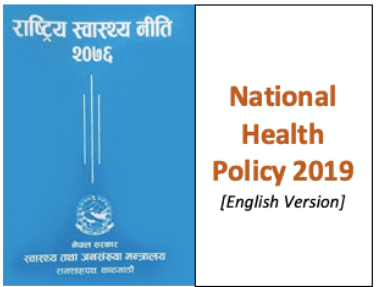Health-Policies-Nepal
Collection of Common Health-Policies-Nepal
Background
In the vibrant landscape of Nepal, where the snow-capped Himalayas meet lush green valleys. The nation’s beauty is matched only by the resilience of its people. Yet, amidst this natural splendor, Nepal grapples with significant healthcare challenges. In this context, the formulation and implementation of robust National Health-Policies-Nepal emerge as an indispensable tool. It safeguards the well-being of its citizens.
Like many developing nations, Nepal faces health issues ranging from infectious diseases to inadequate access to essential healthcare services. These challenges are compounded by geographical terrain, socio-economic disparities, and a rapidly growing population. Against this backdrop, a comprehensive National Health Policy becomes paramount in addressing these multifaceted concerns.
At its core, a National Health Policy serves as a blueprint for the equitable distribution of healthcare resources. We need enhancement of healthcare infrastructure, and the promotion of preventive measures. By outlining clear objectives and strategies, such policies lay the groundwork for improving access to quality healthcare services. It includes remote and underserved regions.
Objectives of Health-Policies-Nepal
One of the primary objectives of National Health Policies in Nepal is to prioritize primary healthcare. It ensures healthcare services are accessible to everyone of every geographical location or socio-economic status. This emphasis on primary healthcare not only facilitates early detection and management of diseases. It also helps reduce the burden on tertiary care facilities.
Moreover, National Health Policies play a crucial role in addressing the emerging health challenges. Nepal is facing non-communicable diseases (NCDs) and mental health disorders. These policies aim to mitigate the prevalence and impact of such health conditions. Policies encompass on the population by incorporating preventive measures, health education campaigns, and capacity-building initiatives.
Furthermore, an effective National Health Policy fosters collaboration between the government, healthcare providers, civil society organizations, and other stakeholders. These policies facilitate the efficient delivery of healthcare services and the implementation of evidence-based interventions.
Notably, National Health Policies in Nepal must also prioritize strengthening healthcare infrastructure, including developing hospitals, clinics, and primary health centers. This infrastructure upgrade is essential for improving the quality of care. We need to enhance diagnostic capabilities, and expanding the reach of healthcare services to marginalized communities.
Conclusion
Finally, National Health Policies are not just papers. They are also tools for change that will help Nepal have a better and wealthier future. These policies help to achieve universal health coverage, better health results, and long-term growth. It help by meeting the various healthcare needs of the country’s people. As Nepal continues progressing, it must have solid national health policies. These policies are the foundation for a healthy and more fair society.

Here are some common Health-policies-Nepal You can download and use it for free.
नेपालको राष्ट्रिय स्वास्थ्य नीति २०७६, Nepal’s National Health Policy 2019
National Health Policy of Nepal 2014 (Nepali version) Download
HRH_Strategy_2030-Nepal नेपालको स्वास्थ्य जनशक्ति राष्ट्रिय नीति Download
